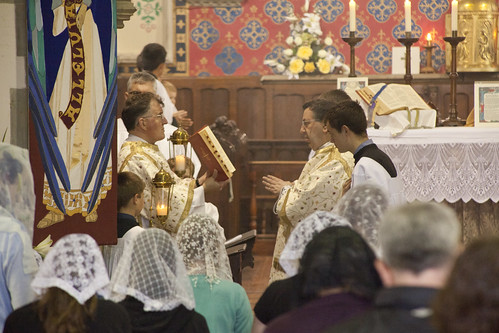Don Pietro Leone, a priest who celebrates the Traditional Mass exclusively in an Italian diocese, and who has sent so many gifts to Rorate readers, including his booklet on the destruction of the Roman Rite and his essay on Modernism, has a new Summer reading gift for our readers -- a long essay on Apostasy.
It is a booklet on Apostasy, and on how abandonment of the truth about God has led to all other evils in the Church and in Society. We strongly suggest you read, print out, send to friends, and spread it around as widely as possible, as it helps explain so much, including how a minority of perverted activists has been trying to alter the very words of Christ on the truth on marriage.
Is there hope? Read the essay to find out!
**********
APOSTASY
a special essay by Father Pietro Leone
for Rorate Caeli
Watchman, what of the Night? (Is. 21.11)
In the Name of the Father and of the Son and of the Holy Spirit. Amen
Here in Italy the summer has reached its height: the sun beats down on the city and on the countryside by day, and by night the elderly sit outside and watch the people passing by.
To the eyes of the Faith, by contrast, the whole of mankind is plunged in the most profound darkness, for both the Church and the World are in the throes of the gravest and most profound crisis in the history of their existence. The crisis is one of Apostasy, not so much in the formal sense of the explicit rejection of the Catholic Faith, but rather in the general sense of the falling away from God.
To help us understand the nature of this apostasy we shall make a brief meditation on the first chapter of the Epistle to the Romans (vv. 17-32), in which St. Paul refers to this same phenomenon in his own epoch. Holy Scripture is widely applicable to the events of human history: we shall see how the passage in question may usefully be applied to the circumstances of our contemporary world.
The elements which we propose to consider in this essay are the following:
I) The suppression of the Truth about God;
II) The refusal to honour God;
III) Foolishness;
IV) Idolatry;
V) Depravity.
PART 1.
I The Suppression of the Truth about God
St. Paul writes (v.18) of ‘those men that detain the truth about God in injustice’. ‘Detain’ (detinere in the Latin, catechein in the Greek) signifies the suppression of that which moves the agent to the good; ‘in injustice’ signifies that this suppression is in opposition to the order that God has established; ‘the truth’, as the context shows and as we proceed to explain, is both the supernatural knowledge of God, namely the Faith, and the natural knowledge of God which is acquired by the use of reason.
The Truth about God which is suppressed in the contemporary world belongs, like the Truth of which St. Paul treats, both to the supernatural and the natural orders.
A. The Suppression of the Supernatural Truth about God

























